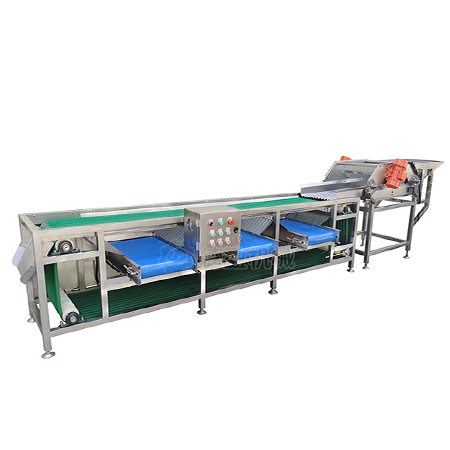As technology continues to redefine agricultural practices, fruit sorters have become a key tool in streamlining fruit processing operations. These machines bring new levels of precision, efficiency and consistency to the sorting process, ensuring only the highest quality fruit reaches the market. This article delves into the complex workings of Fruit Sorting Machines and explores their diverse applications in agriculture.

1. Working principle of Fruit Sorting Machine:
Data analysis: The collected data is processed through complex algorithms that analyze colour, size, shape and even internal qualities such as ripeness and sugar content.
Sensor technology: Fruit sorting machines use advanced sensor technology such as cameras, lasers and near-infrared spectroscopy to evaluate various characteristics of the fruit.
Mechanical sorting: Based on analysis, machines use mechanical systems such as conveyor belts, jets, and robotic arms to sort fruits into different categories.
Customized parameters: The operator can set specific parameters and customize the sorting standards according to the requirements of different fruit varieties.
2. Application of fruit sorting machine:
Quality Sorting: Fruit sorting machines excel at accurately separating fruits based on quality attributes. This ensures that only high-quality fruit reaches the market and meets consumer expectations.
Size sorting: Sorting machines sort fruit according to size, allowing for uniform packaging and pricing. This feature is especially important to meet industry standards and customer preferences.
Color sorting: Precise color sorting helps eliminate blemished or undesirable colored fruits, enhances the visual appeal of packaged fruits and improves market competitiveness.
Ripeness assessment: Some advanced sorting machines can assess the ripeness of fruit, allowing growers to harvest at the optimal time and reduce the chance of premature spoilage.
Foreign Object Detection: Fruit sorting machines can detect and eliminate foreign objects such as debris, insects or diseased fruit, ensuring the safety and hygiene of the final product.
three. Advantages of fruit sorting machine:
Improved Accuracy: The accuracy provided by sorters ensures consistent quality that meets strict industry standards and consumer expectations.
Improved efficiency: The automated sorting process significantly increases the speed and efficiency of fruit processing, reducing labor costs and manual errors.
Reduced waste: Sorting machines help reduce food waste by eliminating defective or substandard fruit early in the production process.
Cost Savings: The long-term benefits of reduced labor costs, increased yields, and reduced waste contribute to significant cost savings for growers and processors.
Fruit sorting machines represent a technological leap in the agricultural field, achieving the perfect combination of efficiency and precision. From enhancing the visual appeal of fruit to optimizing harvest time, these machines play a vital role in ensuring consistent, high-quality fruit is delivered to consumers. As the agricultural landscape continues to evolve, the adoption of fruit sorting machines demonstrates the industry's commitment to innovation and excellence.




